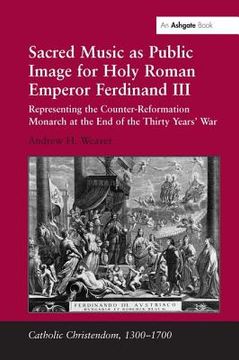Synopsis "sacred music as public image for holy roman emperor ferdinand iii"
Ferdinand III played a crucial role both in helping to end the Thirty Years' War and in re-establishing Habsburg sovereignty within his hereditary lands, and yet he remains one of the most neglected of all Habsburg emperors. The underlying premise of Sacred Music as Public Image for Holy Roman Emperor Ferdinand III is that Ferdinand's accomplishments came not through diplomacy or strong leadership but primarily through a skillful manipulation of the arts, through which he communicated important messages to his subjects and secured their allegiance to the Catholic Church. An important locus for cultural activity at court, especially as related to the Habsburgs' political power, was the Emperor's public image. Ferdinand III offers a fascinating case study in monarchical representation, for the war necessitated that he revise the image he had cultivated at the beginning of his reign, that of a powerful, victorious warrior. Weaver argues that by focusing on the patronage of sacred music (rather than the more traditional visual and theatrical means of representation), Ferdinand III was able to uphold his reputation as a pious Catholic reformer and subtly revise his triumphant martial image without sacrificing his power, while also achieving his Counter-Reformation goal of unifying his hereditary lands under the Catholic church. Drawing upon recent methodological approaches to the representation of other early modern monarchs, as well as upon the theory of confessionalization, this book places the sacred vocal music composed by imperial musicians into the rich cultural, political, and religious contexts of mid-seventeenth-century Central Europe. The book incorporates dramatic productions such as opera, oratorio, and Jesuit drama (as well as works in other media), but the primary focus is the more numerous and more frequently performed Latin-texted paraliturgical genre of the motet, which has generally not been considered by scholars as a vehicle for monarchical representation. By examining the representation of this little-studied emperor during a crucial time in European history, this book opens a window into the unique world view of the Habsburgs, allowing for a previously untold narrative of the end of the Thirty Years' War as seen through the eyes of this important ruling family.

